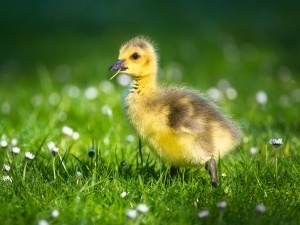
Some animals have a very strange way of walking, humans walk, snakes slither, and ducks waddle. The waddling may look strange but it is normal. Ducks waddle because their feet are webbed, and webbed feet are normal for ducks.
What isn’t normal is the animal’s feet turned inward. If your duckling’s feet are turned inward you’d be right to be worried, this article explores why that happens.
Table of Contents
Duckling feet turned inward
If one, or some, of your ducklings have feet that look different than the others you’d be right to be concerned. This may be happening because the bird has a niacin deficiency. This is what you need to know about a niacin deficiency in ducklings:
Niacin deficiency in ducklings:
Niacin, known as nicotinic acid, or vitamin B3, is an essential nutrient that living organisms, like ducklings, need. This essential nutrient is formed from tryptophan which is an amino acid.
Niacin is crucial in that it helps in the overall formation of a duckling’s bone structure and its overall well-being.
Niacin is water soluble so it needs to be ingested daily. Water-soluble nutrients are not stored in the body.
If the body has too much niacin in it then the bird’s body will remove the excess through its waste. The duck will need a new supply soon again since niacin is not stored in the bird’s body.
Symptoms of niacin deficiency in ducklings:
Niacin plays a major role in bone formation, a lack of, or no niacin, in the bird’s diet will negatively affect the bird’s feet and thus negatively affect the mobility of the duckling.
A lack of niacin in a duckling’s body will lead to the bird being reluctant to move around, a weakness of the legs, bowed legs, laying down often, and stunted growth, it will also cause the duckling’s feet to point inwards.
The duckling may also start using its wing to help it move around its pen. The growth of the duckling is also affected by a lack of niacin, a niacin-deficient bird will not gain weight as it should.
The signs of a niacin deficiency manifest faster in younger ducklings than in older ducks. If left unchecked, a lack of niacin in your duckling may prove to be fatal quite quickly.
How to diagnose a lack of niacin in ducklings:
To correctly diagnose a niacin deficiency in your ducklings you would need to figure out how much niacin the bird is actually eating, namely from the feed that the bird is eating.
Take a look at the feed you’re giving the bird, if you are feeding the bird a chick starter then this may be the reason your bird is deficient in this nutrient.
Ducks need two to three times more niacin than chicks, thus, chick starter will not be appropriate for ducklings.
A duck suffering from a niacin deficiency will develop symptoms gradually, the symptoms do not develop spontaneously.
A sudden change in the walking pattern of the duckling does not necessarily point to niacin deficiency, it may mean that your bird has other health problems.
Treatment options:
The recommended treatment for a niacin deficiency in ducklings is giving these birds niacin (vitamin B3) supplements.
Vitamin B supplements, usually used for cattle, are very effective treatments for ducklings suffering from this condition. Human niacin capsules mixed with water can also be given to affected ducklings to treat the condition.
When administering vitamin B supplements to ducklings it is recommended that you mix them with their favorite treats, like lettuce, peas, mealworms, and watermelon, and then feed these to the ducklings.
If the ducklings do not seem interested in taking the treats with added supplements, then you can spread the supplements across the bird’s feed for the entire day.
The birds may not enjoy the taste of the supplement given in large quantities but splitting it up may help as the taste won’t be so potent.
If the bird’s condition is very serious, and the bird is in bad shape, then you may have no other choice but to administer the supplements directly and orally.
Do this by using a tiny syringe to deliver the supplement directly to the duckling’s mouth.
The treatment should be administered every day even for several weeks, even after the duckling stops showing symptoms.
While recovering, the duckling should have clean bedding and should be offered water and food often. A little exercise for the duckling also goes a long way in helping ease the pain and discomfort in its feet.
If you enjoyed this article then you may also be interested in other duck related articles. Here are some articles that you may be interested in: Duck dragging leg, Duck foot swollen, How to splint a ducks leg, How to keep ducks safe on a pond

